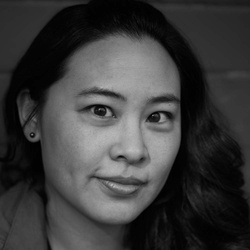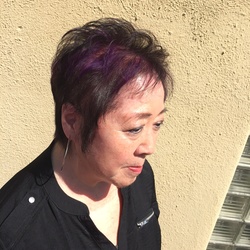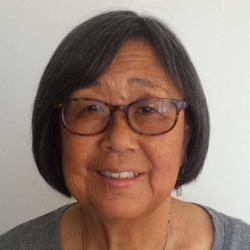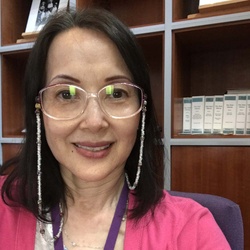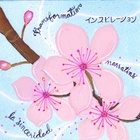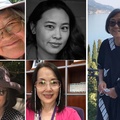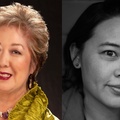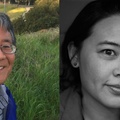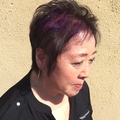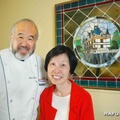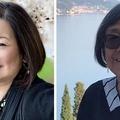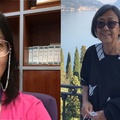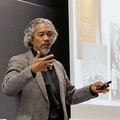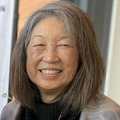To borrow from the title of one of this month’s features, the theme for this month is all about paying homage to one of our most beloved writers, Amy Uyematsu. Amy has been writing and teaching for decades and is going through the fight of her life right now—and what is a community-based poetry column if not a platform to support the best energies and wishes possible for the better health of one of our own poets?
You will see Amy’s poems throughout the lifespan of this column and much more importantly, through her incredible collection of work featured in several tomes. I have long held her classic 30 Miles From J-Town close to my LA-spirit & heart and greatly admire what smolders in the voice of all of her books—Nights of Fire, Nights of Rain (1998); Stone, Bow, Prayer (2005); The Yellow Door (2015).
For the last several years, Amy has been teaching a writing class in Little Tokyo and has kept it up online throughout the pandemic. I asked her if she would let me invite her students to submit some pieces in homage to her and I’m so thankful she agreed. Her main students from the last 4–6 years came together quickly for this effort and wrote in fierce tribute to Amy. We are honored to share the pieces here from the wonderful Nina Chan, Miya Iwataki, Kathy Masaoka, and Keiko Miya. Please send Amy your best along with us, and enjoy…
—traci kato-kiriyama
* * * * *
Nina Chan is a Chinese-American family doctor who enjoys writing. She lives in the San Fernando Valley with her husband, her dog, and her two children. She writes poetry in her spare time with inspiration from her writing group, the Women Word Warriors.
Ode to Amy—Sisterhood is not a soft thing
I was a foundling when she took me in
A young girl, not Japanese, but Chinese
Close enough, for those on the outside
Somehow wandered into their fortress of words
Set in the heart of Little Tokyo
In an unassuming room I passed almost daily
Within walking distance of my home
I would soon have my first baby, a boy
Good fortune for those from Asian countries
Girls to this day still undervalued
Except for their reproductive abilities
“Our family is unlucky, we can only have girls”
My mother had told me,
Pointing out my sister and me,
Her sister, my girl cousins
Here I was at the doorstep
After a lifetime of being surrounded by women
Insecurity ringing in my ears
Seeking that fabled sisterhood
A lost and orphaned voice
No history to ground me
No culture to inspire me
And suddenly the door was open
Quickly assimilated, into the fold
Of those who understood how hard it was
To look like me
To feel like me
To think like me
To pretend, like me
As expected with women
There was always food
Although the words we put in our mouths
Nourished us far better
There was often laughter
Finding grace and gratitude in many ways
Even humor from tragedy
Could help us heal
Tunnels and rooms, built by teacher,
like a dizzying maze of floral bedsheets
to amuse and surprise children on a rainy day
A joy of journey, the delight of discovery
More important than the rooms themselves
As we were guided to inspect
The different meanings of things
Prompts to stretch our minds each week
It was a space to be fierce and unapologetic
To lay bare our true opinions
To explore the range of emotions
Vulnerable, insecure, instinctual, shameful
A powerful way to create empathy
Our printed words papered walls in layers
Until they became solid like wood
Under the pressure of our thoughts
The force of our emotions
Words became our weapons
Against our outrages
Politics, history, religion
Materialism, nature, humanity
Community, family, ourselves
A sharpened wit
By far the most effective barb
And slowly, I learned from teacher
As we all did, and from each other
Never pushing, but with gentle support
The importance of patience,
Combined with fortitude
Sisterhood is not a soft thing
*This poem is copyrighted by Nina Chan (2021)
* * * * *
Miya Iwataki’s life experiences as a poet, writer, host/producer of East Wind Radio series; designer of diversity and cultural competency programs for LA County; NCRR fighter for Japanese American reparations; one of 30 women sponsored by United Nations NGO to UN Decade for Women Convention in Nairobi, Kenya; and co-author of first study on cultural barriers to reproductive health care in 8 API communities have shaped a lifelong understanding, awareness, and commitment to justice and equity. It has breathed life into the importance of valuing cultural beliefs, practices and traditions in health, and in our daily lives; and an appreciation for how deeply language is tied into, and reflects our culture.
ODE TO AMY
With Love from Miya Iwataki
You brought poetry back into my life.
I, immersed in Cultural & Linguistic infrastructures
Drowning in decades of policy reports and political analyses
I emerged gasping, gulping deep breaths of freshly found metaphors
Freedom from formulaic writing
You brought Little Tokyo as our creative setting
One you instinctively knew would inspire
As we aspired to make our words soar
While seated on folding chairs at a portable table
In the spare setting of the Far East Lounge.
You transported me back home to
Shine a new light on South Pasadena
Where I found poetry in my morning walks
Amid parading prides of peacocks, the Kaldi café
And opera singers warbling arias in the morning dew
You surprised us with a Tree “writing assignment”
And I discovered the mystical Moreton Bay Fig Tree
Legendary “Sentinel of South Pasadena”
Same genus as the Aoyama Ficus, Little Tokyo’s Sentinel
And Little Tokyo and South Pasadena became
Connected through legacy and poetry
You took us to Descanso Gardens
To walk among the largest collection of camellias in America
300,000 camellias “purchased” from Uyematsu Star Nursery
When the family was sent to Manzanar
Later we sat in the garden to reflect and write, always write
Our trip to Descanso sparked new energy for my garden
Where my “brown thumbs” proudly pruned and proselytized
The pleasure of camellia trees and fragrant gardenias in full bloom
Whose splendor I captured in photographs and
Haiku celebrating passion, beauty and sadness
Our writing sessions were rich with Sisterly support, local gossip,
Japanese snacks, home-baked goods and garden fresh fruit.
A White Elephant potluck and gift exchange was a favorite
Annual holiday celebration hosted at your beautiful home,
A “museum” of Japanese and Chicano/Latino expression.
You crushed any Marie Kondo pretenses I had
Through your generous book-giveaways
Tempting me with titles I could not resist
Poetry of Resistance: Voices for Social Justice and
Titillating my curiosity with titles like Asian Pulp
A collection of mysteries, crime and noir
These books have rejoined other comrades
From Amy’s vast library, and now occupy
Their own special corner of my crowded living room.
Meanwhile Amy, with a Mona Lisa smile,
Revels in her successful spring cleaning.
*This poem is copyrighted by Miya Iwataki (2021)
* * * * *
Kathy Nishimoto Masaoka was born and raised in multicultural Boyle Heights. The Vietnam War and Asian American Studies at University of California, Berkeley in the late ’60s were important influences on her values. Since the 1970s, she has worked on youth, workers, and housing issues in Little Tokyo, and Japanese American redress. Currently Co-chair of the Nikkei for Civil Rights & Redress (NCRR), she served on the Editorial Team for the book, NCRR: The Grassroots Struggle for Japanese American Redress and Reparations, helped to educate about the camps through the film/curriculum, Stand Up for Justice, and worked on the NCRR 9/11 Committee to help build relationships with the American Muslim community through programs like Break the Fast and Bridging Communities.
She represented NCRR to support the rights of Korean and other minorities in Japan and is involved with Nikkei Progressives, Vigilant Love, and the Sustainable Little Tokyo project, and working on issues such as reparations for Comfort Women and Black folks, the rights of immigrants, and Little Tokyo’s future.
Ode to Amy
I’ve got writer’s block
And I blame the pandemic
So what do I do
I turn to Amy’s advice
Culled from all our classes!
Journal—write down everything, do not cross out anything, don’t think, don’t judge, just let it flow.
Read good poetry and keep notes on words, phrases and lines that jump out at you.
Amy has shared so many good Asian American writers with us: Lawson Inada, Cathy Fong, Garrett Hongo, Alan Chong Lau, Jessica Hagedorn, Sesshu Foster, Janice Mirikitani, Nanao Sasaki, Issei poets at Stockton, Rowher, Tule Lake, Victoria Chang, Mitsuye Yamada, Li-Young Lee and more.
She has brought in poems from numerous Black, Brown and Indigenous poets: William Carlos Williams, Lucille Clifton (one of Amy’s favorites), Juan Felipe Herrera, Nikkei Giovanni, Joy Harjo, Ruth Forman, Langston Hughes, Alberto Rios, Jayne Cortez, Gwendolyn Brooks, Pablo Neruda, Ray Gonzalez, Pam Ward, Paul Laurence Dunbar, Tony Robles, Francisco Alarcon and more.
And these are just from the first two years of our class!
Powerful poems about war and violence, places, immigration, dreams, history and racism, ethnic foods, nature, politics, Black lives, lynchings, love and hate, community and family.
If you are still having writer’s block, Amy has guided us in:
Making lists—“I am…” or “ A car is…”
Writing skinny poems and short poems and even one-word-a-line poems
Compiling a list of quotes and ordering them into a poem or
Taking a line from another poem and starting your own
Trying our hand at a Pantoum—repeating lines in a certain pattern
Creating haikus and breaking the rule of 5/7/5
Walking outside to look, listen and take note of what you are feeling and thinking
Taking inspiration from a photo or a person you observed and telling their story
Amy says, “It does not even have to be a poem. Write prose or a story and even though I gave you an assignment, I know you will write whatever you want!”
AMY
Patiently pushing
“I see two, three more poems
Keep going, write more
You have a lot more to say”
Always prodding us, gently
Kathy Masaoka, 8/13/21
*This poem is copyrighted by Kathy Nishimoto Masaoka (2021)
* * * * *
Keiko Ikari Miya’s upbringing both in Kesennuma, Japan and in the US (New York City and Southern California) has made her keenly aware of the differences in societies. She was able to enjoy being a classroom teacher at an elementary school in Maywood, CA for 11 years, then at Roosevelt High School, Boyle Heights as a teacher of Japanese for 17 years. The 23 years in NYC and 35 plus years in SoCal have afforded Keiko experiences working with people of many races and ethnicities, and she finds joy in working with people emphatically. Keiko has been enjoying volunteering at the Japanese American National Museum (JANM) since 2017, especially helping the offspring of Issei and Nisei families research their ancestors’ roots, mainly in the U.S. The Hirasaki National Resource Center of the Museum offers this opportunity for research.
Dear Amy,
It was written in the stars …
my father and his brother, my uncle, worked
for your grandfather and father in the 1930s in Montebello
Indeed, the place was called Star Nursery
UNSPEAKABLE strife ensued for those generations
Fast forward 80 years…
after crossing the Pacific from Japan
then back and forth from coast to coast
I land into your class (more like crash landing)
I wanted to improve my writing
You asked if I wanted to write poetry
I jumped at the chance to explore
You offered yourself up to coaching
As many as seven pupils at any one time
All gratis, only requiring us to keep writing
Especially by hand
You want us to be aware of other thinkers
Suggesting that we share quotes from them
You prepare readings from a poet or two or three
On whose themes you base your assignments
Assignments always laissez faire in our rendition
Be they in poetry, short essay, prose poetry, letter forms
The longest theme was on “lines of any kind”
It was then that I came to one of several hopeful beliefs
I had in studying under you:
Perhaps racism may be eradicated within the millennium, hopefully.
Through intermarriage there will be more people who will look
Similar in color and with shape of eyes, stature, height
Lineages will not be many long lines as now or before
Replaced by more intertwined branches, henceforth
People in the future will share many common ancestries
It is hoped racism is only skin deep
More personal and religious catharsis
Came to light in your class, mostly for a platform
To express it in writing
A common activity I share with you
is the love of daily crossword puzzles
from the newspapers
You inspired me to tackle the Sunday Times puzzle
I love words, ergo, notes on new words learned are kept
You amaze me with your devotion to daily sudokus all
But then math was your livelihood
which made your father proud, you said
I liked math up to geometry, disliked bookkeeping
Was enthralled when KenKen involving math operations
First appeared, then my brain got fried up, not fired up
It was wonderful to see you in early August this year
Your words, “always better to see you in person”
so warmed my heart
Hasn’t the year of Zooming gone so fast?
You said, “When I Zoom again, the first would be our class”
You are heartily asked to join and lead us again
as a guiding star
anytime and always.
Love,
Keiko (Miya) August 14, 2021
Owed (Ode) to Poet Amy
our mutual forefathers
foresaw our destiny
to become intertwined.
you becoming my mental mentor
then a societal one too.
for six years that have quickly flown
asking no remuneration of any kind
only that we students create in writing.
we owe you so much already
but we look forward to owing you some more.
Keiko Miya June 10, 2021
*These poems are copyrighted by Keiko Ikari Miya (2021)
© 2021 Nina Chan, Miya Iwataki, Kathy Nishimoto Masaoka, Keiko Ikari Miya






